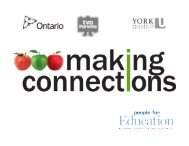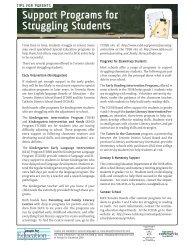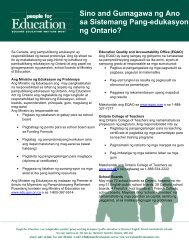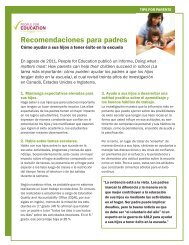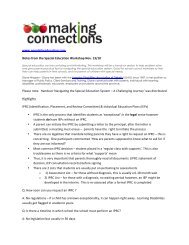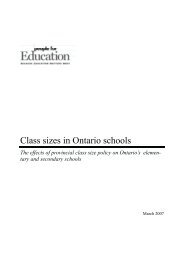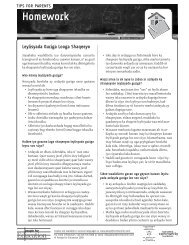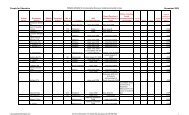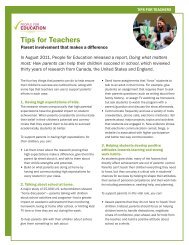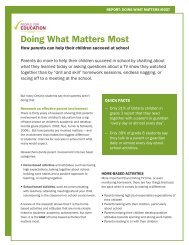Our Children Our Future Our Vision - People for Education
Our Children Our Future Our Vision - People for Education
Our Children Our Future Our Vision - People for Education
Create successful ePaper yourself
Turn your PDF publications into a flip-book with our unique Google optimized e-Paper software.
<strong>Our</strong> <strong>Children</strong>, <strong>Our</strong> <strong>Future</strong>, <strong>Our</strong> <strong>Vision</strong><br />
8. New Agenda Survey Results Report<br />
First Nation <strong>Education</strong> Governance and Control in Ontario: A New Agenda<br />
Results of the Survey by Barry M. Montour, Ph.D.<br />
Introduction to the Study<br />
The New Agenda Working Group constructed a survey instrument to gain feedback on issues<br />
impacting First Nations students, teachers, parents, and schools. It was designed to give voice to<br />
those directly affected by any changes to the funding and delivery of educational services to First<br />
Nations students in Ontario.<br />
The instrument received input from a wide audience of stakeholders in First Nations education: teachers,<br />
educational assistants, counselors, school and board administrators, parents, guardians/care-givers,<br />
First Nation politicians, and band council administrators, among others. The survey was voluntary,<br />
but was accessible through the Chiefs of Ontario website, at four sessions held in Ontario, and<br />
through mass e-mailing to various organizations, institutes, band councils, tribal councils, and schools.<br />
The purpose of the survey is to complement the final report submission from the Chiefs of Ontario<br />
to the Minister of Aboriginal Affairs and Northern Development Canada (AANDC) and the National<br />
Chief of the Assembly of First Nations (AFN) regarding improving First Nation education from an<br />
Ontario perspective.<br />
Survey Format<br />
In addition to four (4) demographic questions, the instrument contained thirty-two (32) questions<br />
under ten (10) categories, and allowed <strong>for</strong> respondents to provide commentary after each category,<br />
as well as an open section <strong>for</strong> final comments at the end of the survey. Due to an oversight during<br />
the design of the survey <strong>for</strong> the on-line version, a comment box was omitted under the category of<br />
Legislation. There<strong>for</strong>e, there are no comments in the analysis section <strong>for</strong> that category.<br />
Questions were drafted by members of the New Agenda Working Group, who have areas of expertise<br />
in early learning, post-secondary, teaching, policy analysis, special education, and legislation,<br />
due to their respective positions in Political Territorial Organizations (PTO), tribal councils,<br />
Aboriginal institutes, the Chiefs of Ontario, and First Nation schools. The survey was field tested at<br />
the London District <strong>Education</strong> Council meeting in August, and suggestions and recommendations<br />
were then incorporated into the on-line survey.<br />
The survey included both quantitative (<strong>for</strong>ced-choice items) and qualitative (open comments)<br />
responses. Data collection was primarily independent with the on-line version of the survey at 67%<br />
(n=168), and 33% (n=81) completed at group sessions with the responses then entered manually.<br />
57 Chiefs of Ontario



